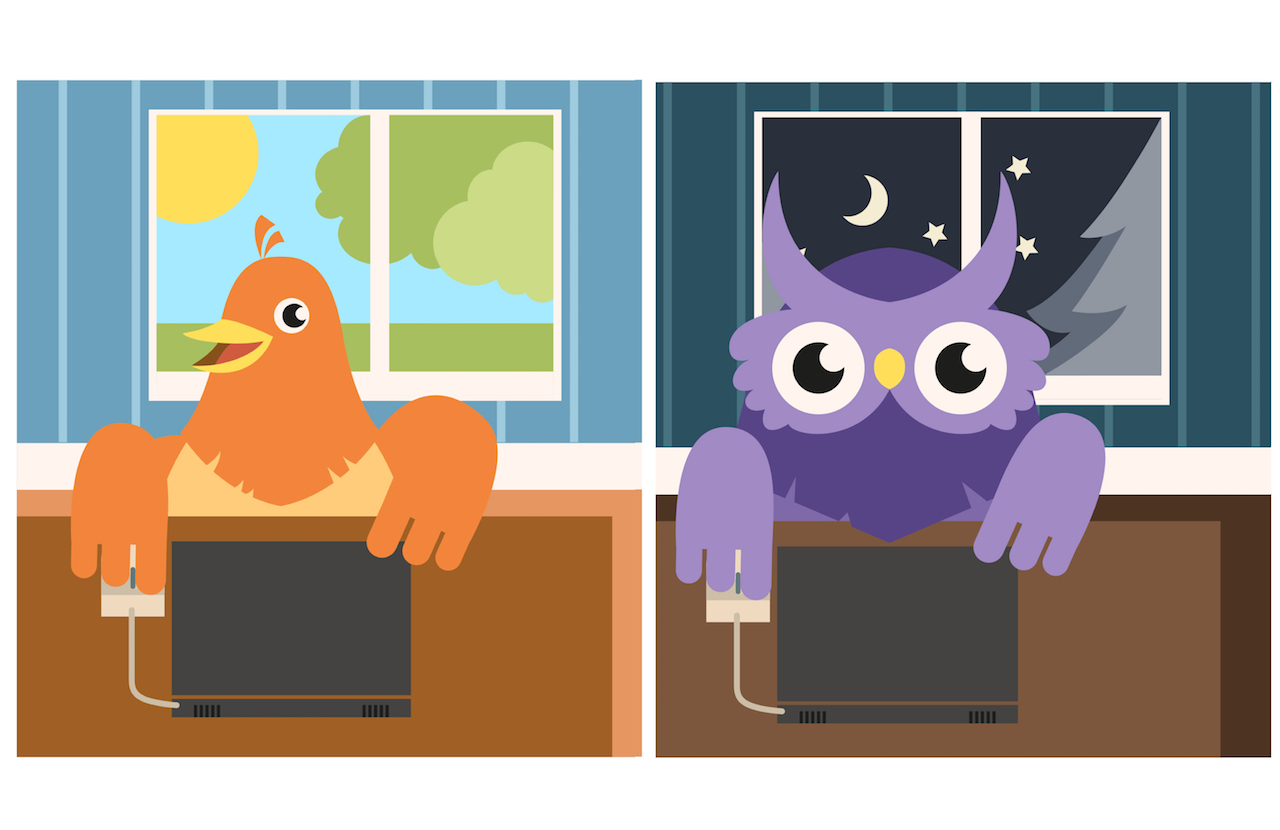When it comes to sleeping, there are two kinds of people, early birds and night owls.
If you tuck yourself into bed before 10 pm on most nights and are up early, ready for the day, you’re an early bird. If you’re up till 2 am without batting a droopy eyelid, you’re a night owl. Whichever you are, depends on your internal body clock, called the circadian rhythm and a system called sleep/wake homeostasis. Sleep/wake homeostasis makes sure that there’s a balance between your sleep and wakefulness.
When you’ve been awake for a long time, sleep/wake homeostasis tells you that you need to sleep soon. It also helps you to get enough sleep throughout the night to make up for the number of hours you’ve been awake. On the other hand, your circadian rhythm has 24 hours and it takes you through a cycle where you feel sleepy or alert, depending on your personal cycle.
What makes you a night owl or an early bird?
Although sleep/wake homeostasis and the circadian rhythm manages our sleep cycle, everyone has their own internal clock called a chronotype. Some people have a slightly longer natural cycle and some are slightly shorter. If your circadian rhythm is longer, you’re more likely a night owl and if it’s shorter, you’re an early bird.
You may be a night owl if:
- You struggle to fall asleep at night and wake up in the morning.
- The idea of eating breakfast is unappealing. Instead, you enjoy large meals during lunch and supper.
- You struggle to work in the morning and for most of the day, but are very productive at night.
- You feel exhausted most days.
You may be an early bird if:
- You can easily wake up early, but struggle to stay up late.
- You feel energised, awake and well in the morning.
- You’re very productive in the morning but start to feel tired as the afternoon rolls around.
- You eat small meals consistently throughout the day and breakfast is a must-have.
Research published in the journal Chronobiology International found that night owls are more likely to suffer from health problems. During the study, researchers analysed the health patterns of over 400 000 adults between 38 and 73 for six years. These included night owls and early birds.
They found that night owls were twice as likely to have psychological disorders and 30% more likely to have diabetes. It was also discovered that their risk for respiratory disease was 23% higher for gastrointestinal disease.
This may be because the lifestyle of a night owl adds strain to everyday activities. For example, an early bird gets better sleep and makes better health decisions so they’re energised for the day, while a night owl’s lifestyle (e.g. being out all night, skipping breakfast and not sleeping enough) makes it difficult for them to function efficiently.
Become a healthier owl
Catch some Zs
Even night owls need seven to nine hours of sleep every night. This will help minimise the risk of your hormones getting out of whack and protect you from other diseases and conditions. For example, if you fall asleep at 2 am, you still need to sleep for eight hours. Adjust your work and study schedule if possible.
Chew carefully
Night owls tend to eat more because they’re up later. Instead of large meals, choose healthy snacks like fruit, veggies, popcorn or nuts. Aim to stop eating at 8 pm.
Socialise!
Night owls keep erratic hours, so may tend to socialise less. This may lead to isolation, which has serious effects on mental health. Make regular lunch or coffee dates with friends, or supper plans with fellow night owls to stay social.
Watch your workout
A sleep schedule that doesn’t coincide with the natural light-dark cycle may cause heart problems and place extra stress on your body. Exercising for at least 30 minutes a day may lower these risks, but night owls need to be careful about the time they choose to work out. Intense workouts may keep you up at night while yoga and walking can help you sleep better.
References:
- http://www.oprah.com/health/health-tips-for-night-owls/all#ixzz5MGVbylxn
- https://www.medicinenet.com/script/main/art.asp?articlekey=211434
- https://sleepfoundation.org/sleep-topics/what-circadian-rhythm
- https://www.utmedicalcenter.org/healthy-tips/165/early-birds-healthier-than-night-owls/
- https://www.forbes.com/sites/quora/2018/04/05/does-being-a-night-owl-affect-your-health/#603a44936e02
- https://www.nigms.nih.gov/Education/Pages/Factsheet_CircadianRhythms.aspx
- https://www.webmd.com/sleep-disorders/features/early-bird-night-owl#1
- https://sleepfoundation.org/sleep-topics/sleep-drive-and-your-body-clock
- https://www.dreams.co.uk/sleep-matters-club/everything-you-need-to-know-about-sleep-cycles/

